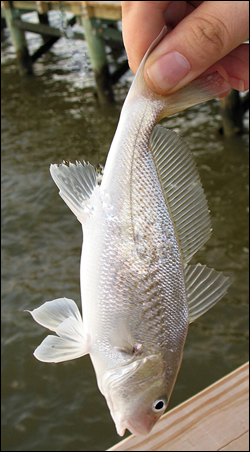Croaker Climate
The fish's future is bright, collaborative study suggests

Jonathan Hare of NOAA's Northeast Fisheries Science Center in Narragansett, R.I. wanted to know how climate change information could be used to help plan for the future of our fisheries. "Most current management plans do not include the effect of climate change on specific fish populations, some of which will increase and others decrease as a result," said Hare.
Hare knew that the Atlantic croaker would be an excellent species of fish for such a study since its survival is directly related to temperature changes. Millions of pounds of this mild-flavored fish are caught in the United States every year. In the winter, croakers travel to shallow bay areas along the U.S. northeast coast and lay eggs. Once hatched, the young fish have a better chance of making it to adulthood when winters are warm. To figure out how climate change might affect croakers, Hare needed the right kind of climate information.
So Hare gave Mike Alexander, of the ESRL Physical Sciences Laboratory (PSL), a call. The two had previously served together on a scientific committee, and Hare knew Alexander worked with climate data.
"I was excited about the prospect of collaborating," said Alexander, a climate scientist who has always been interested in marine biology. He had already done research on how climate variability may impact amphibians and stellar sea lions, for example. He worked with Hare to determine what data would be best for this study and where to get it.
Because ocean temperatures in near-shore bays and estuaries generally track the overlying air temperature, the latter could be used as input to the croaker model. Alexander and Jamie Scott (PSL and CIRES), extracted air temperatures along the U.S. East Coast spanning 1870-2001 from 14 General Circulation Models (GCMs) that were used in the Intergovernmental Panel on Climate Change Fourth Assessment Report. Also used from this widely established and freely available dataset were three different CO2 scenarios that estimate greenhouse gas and air temperature changes from the present out to the year 2100. Alexander also helped explain the climate models, how to use the data, and checked the consistency of the information both in nature and within the model.
Hare and his colleagues at NFSC then fed the climate data into a fish population model that combined temperature and fishing rates; two key factors that affect fish mortality. This new fish-climate model is one of the first to look at the relationship between temperature change and its impact on a specific fish population.
The results looked pretty positive for the Atlantic croaker: If global temperatures continue to increase as predicted, more croakers will make it to adulthood and, therefore, the population will grow. Climate change may also widen the geographic range of croakers. Currently the Chesapeake Bay houses the highest density of croakers. Over time their range could expand into an area around New York.
The team of scientists published their work in the March 2010 issue of Ecology Applications.
Alexander cautioned that the results are specific to the Atlantic croaker: "While climate change may increase the population and range of croakers, it is likely to adversely affect other fish such as cod," he said. Because climate change information has not traditionally been included in fisheries planning, this model could be a breakthrough in performing stock assessments and planning for sustainable fisheries.
Hare concluded: "Our results demonstrate that climate effects on fisheries must be identified, understood, and incorporated into the scientific advice provided to managers if sustainable exploitation is to be achieved and maintained in a changing climate."
Current GCMs can only provide forecasts out to 50-100 years, a bit far in the future for most fisheries planning, said Hare. Shorter-term forecasts ranging between 5-50 years may soon become available for incorporation into fisheries models, to make even better informed decisions.
By Barb DeLuisi, Spring 2010